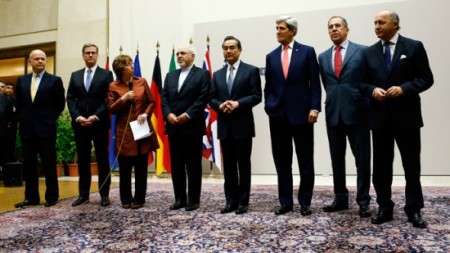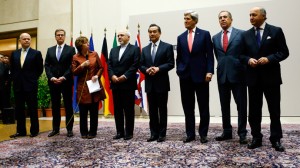
5 Reasons Why More Sanctions Should Not be Imposed on Iran at This Time
 There is one thing right now that everyone wants: the successful dismantlement of Iran’s nuclear program. Secretary of State John Kerry, along with other diplomats representing the P5+1 and Iran, were able to sit down together at the negotiating table throughout the past few months and hammer out a deal that serves as the first step towards that long term goal.
There is one thing right now that everyone wants: the successful dismantlement of Iran’s nuclear program. Secretary of State John Kerry, along with other diplomats representing the P5+1 and Iran, were able to sit down together at the negotiating table throughout the past few months and hammer out a deal that serves as the first step towards that long term goal.
Currently, there is talk about imposing MORE sanctions on Iran just as the first stages of an agreement have been reached. Not only is this unnecessary at this stage, but it could also be completely counter productive.
“I think that the idea of imposing new sanctions right now is a terrible mistake and would be a strategic error.” – Former Secretary of Defense Bob Gates during PBS News Hour on Tuesday.
Here are 5 reasons why more sanctions should not be imposed right now…
1) We Should Give the Deal a Chance to Succeed
The agreements negotiated over the past few months that concluded Sunday in Geneva, known as the Joint Plan of Action, gives us assurance that as of January 20th Iran will have to take steps to halt the progress of its nuclear program. We will be able to monitor Iranian compliance every month, and if the deal succeeds, we will have assurance that Iran cannot threaten anyone with nuclear weapons.
2) New Sanctions Will Undermine the Chance for an Ultimate Resolution
If new sanctions were imposed on Iran, the historic progress made through negotiations, along with the credibility of our diplomats would be completely undermined. It would not only jeopardize our current steps forward with Iran, but endanger our diplomatic efforts around the world. If our diplomats are saying one thing, and Congress is doing another, it will endanger future diplomatic efforts with both allies and enemies.
3) New Sanctions Increase the Chances of War in the Middle East
Under the Geneva deal, new sanctions are not to be imposed for 6 months as long as Iran complies with the commitments it made. Passing new sanctions now, if Iran is in compliance, could bring a complete end to negotiations and erase the progress made. The end of negotiations would leave the U.S. and international community with few options other than war to prevent Iran from obtaining a nuclear weapon.
4) Present Sanctions have Served Their Purpose… For Now
Sanctions have already accomplished their intended purpose: getting Iran to the negotiating table. Iran has said that new sanctions will kill the nuclear deal and end diplomatic talks. Applying more sanctions at this time would thus be counterproductive, pushing the Iranians away from the table and undoing years of work. New sanctions should only be enacted if Iran is in violation or leaves negotiations, as a measure for ensuring compliance.
5) New Sanctions Won’t Stop Iran from Developing a Nuclear Weapon
The idea of sanctions themselves is not to disable Iran’s nuclear program, but to make it too painful for the Iranians to continue. It would be wrong to underestimate Iran’s pain tolerance.
Without a deal in place, Iran will most likely continue to develop their nuclear program, especially as it would be unaccountable to the P5+1 and the transparency provided by inspections and reviews by the IAEA.
The inspections, which will begin on January 20th according to the Joint Plan of Action, will review Iran’s nuclear facilities and verify whether or not Iran is taking steps to fulfill its commitments. The IAEA’s report, due to be released on the same day, will highlight the overall status of the nuclear program.
As Secretary of State John Kerry said on Monday:
“We now have an obligation to give our diplomats and experts every chance to succeed in these difficult negotiations. I very much appreciate Congress’ critical role in imposing the sanctions that brought Iran to the table, but I feel just as strongly that now is not the time to impose additional sanctions that could threaten the entire negotiating process. Now is not the time for politics. Now is the time for statesmanship, for the good of our country, the region, and the world.”





